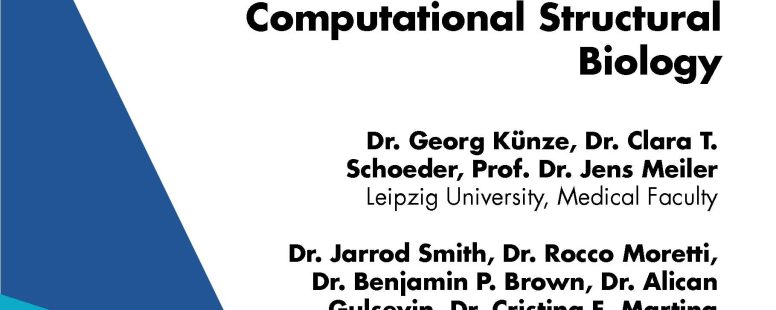01-05.08.2022: Scientific Module “ALPHAFOLD, ROSETTA, AND AMBER: Principles and Applications of Computational Structural Biology”
We cordially invite you to a one week block online seminar “ALPHAFOLD, ROSETTA, AND AMBER: Principles and Applications of Computational Structural Biology” by:
Dr. Georg Künze, Dr. Clara T. Schoeder, Prof. Dr. Jens Meiler
Leipzig University, Medical Faculty
Dr. Jarrod Smith, Dr. Rocco Moretti, Dr. Benjamin P. Brown, Dr. Alican Gulsevin, Dr. Cristina E. Martina
Vanderbilt University
DATE
01 – 05. August 2022, EST
The class will meet virtually on 5 days in the week from August 1st to August 5th always 3 pm-6 pm . The laboratory portion will proceed on the same dates 7 pm-10 pm. Additionally, a short introduction to the Linux command line will be offered on the first day. This is a one credit course.
COURSE DESCRIPTION
Proteins and nucleic acids have characteristic three-dimensional structures which equip them to play specific roles as, e.g., receptors, enzymes, transporters, antibodies, or cellular scaffolds. The number of experimentally determined structures of biological macromolecules in the worldwide protein databank (PDB) has increased substantially over the last years, and more than 200,000 biomolecular structures are currently available. By analyzing these structures, we not only obtain detailed insight into the way how biomolecules function, but also gain understanding about the design principles of proteins and the evolution of protein structure on a large scale.
To access, interpret, and manipulate structural data of biological macromolecules, computational methods have become an indispensable tool that enables researchers to solve diverse biological problems. For example, how do mutations in a gene affect a protein’s shape or the binding of a small-molecule substrate? How do membrane proteins couple chemical signals to the transport of small molecules or ions across the cell membrane? How can the affinity of an antibody recognizing a viral protein be increased to block virus entry into cells and prevent an infection?
The course will cover the theory, computational algorithms, data resources, and practical tools used for the study of biomolecular structure. Students will get introduced into ALPHAFOLD, ROSETTA, and AMBER, comprehensive software packages used for a wide range of applications such as the prediction of protein structures with and without the aid of experimental data, the modeling of the interaction of proteins and peptides with each other and with small-molecule ligands, and the design of proteins with improved or completely new functionalities. Computational structural biology methods become increasingly important for the interpretation of biological findings (e.g., from genomics data) and the engineering of therapeutics and probe molecules in biomedical research. The course will include practical lab exercises that will consolidate the theoretical concepts learned and train students how to use ALPHAFOLD, ROSETTA, and AMBER to perform advanced computational experiments.
PROGRAM:
Program Overview (PDF)
WHO:
Students and doctoral researchers, postdocs, public, for interested parties
GRADING:
This is a one credit course. There will be a multiple-choice exam (50%) at the end of the course and the laboratory portion will be graded (50%).
ROOM:
Virtually via Zoom.
REGISTRATION:
Students who wish to take the class for credit should register as soon as possible! Students, postdocs, and faculty who wish to audit the class are welcome. Please send a note to Anett Albrecht ().
PROGRAM
MONDAY (08/01/22)
LECTURE (3 pm – 6 pm)
Fundamentals of protein structure and protein structure determination • data representation and databases • visualization of protein structures
LAB (7 pm – 10 pm)
Computer setup • introduction to the Linux command line • shells • Linux filesystem • text editors • data processing tools • visualization of protein structures • PYMOL and CHIMERA
TUESDAY (08/02/22)
LECTURE (3 pm – 6 pm)
Prediction of protein structure from sequence • Homology modeling • De novo protein structure prediction • ALPHAFOLD and ROSETTA
LAB (7 pm – 10 pm)
Prediction of protein structure from sequence • Homology modeling • De novo protein structure prediction • ALPHAFOLD and ROSETTA
WEDNESDAY (08/03/22)
LECTURE (3 pm – 6 pm)
Molecular Dynamics theory • Force fields • Use cases and limitations • Coarse-grained models • Hybrid methods • MD with enhanced sampling
LAB (7 pm – 10 pm)
MD simulation of protein-ligand complex • ligand parametrization • system solvation, minimization and equilibration • production MD and analysis
THURSDAY (08/04/22)
LECTURE (3 pm – 6 pm)
Computer-aided drug discovery • QSAR • Protein-ligand docking • Structure-based virtual screening • BCL and ROSETTA
LAB (7 pm – 10 pm)
High-throughput virtual screening (vHTS) • Docking predicted vHTS hits • Structure-based hit optimization
FRIDAY (08/05/22)
LECTURE (3 pm – 6 pm)
Computational protein design • Antibody design • Epitope-focused immunogen design • ROSETTA
LAB (7 pm – 10 pm)
Affinity maturation (Single state and multistate design) • Epitope grafting • ROSETTA

